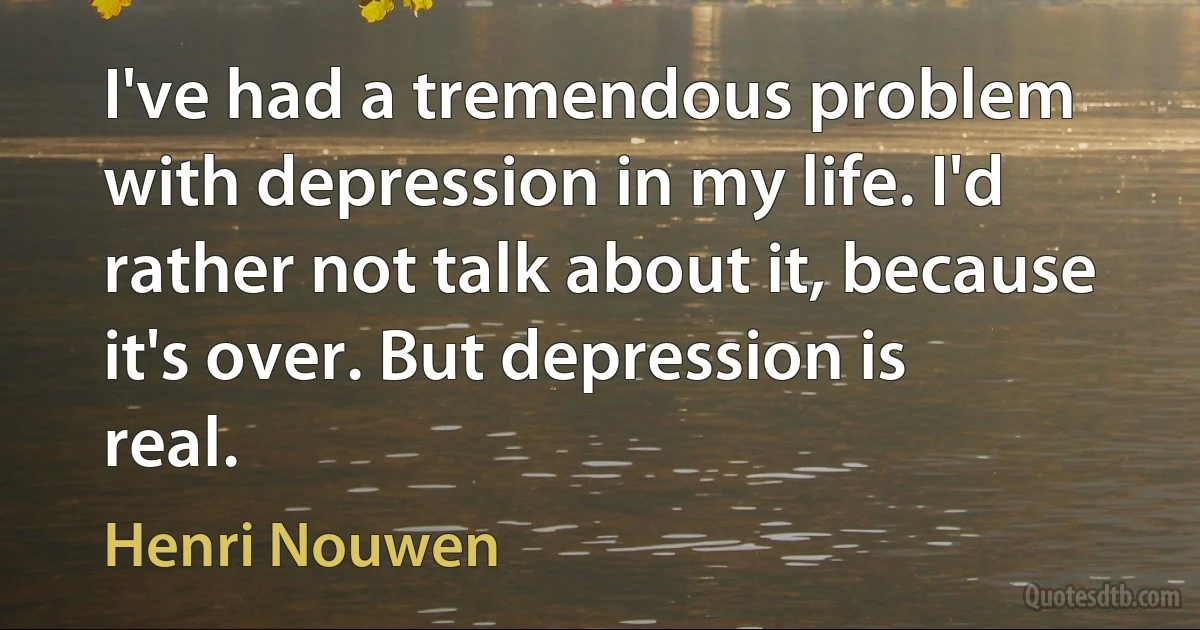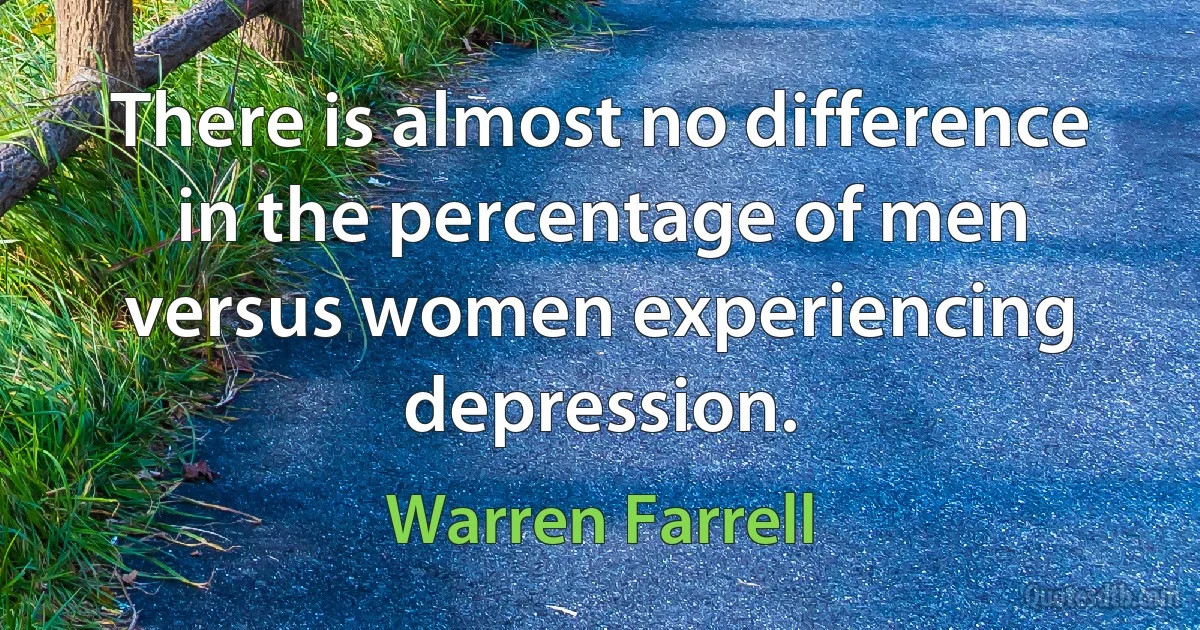Depression Quotes - page 28
On the one side, the Mexican side, Mexican peasants are tantalized by the American possibility of change. On the other side, the American side, the tyranny of American optimism has driven Americans to neurosis and depression, when the dream is elusive or less meaningful than the myth promised. This constitutes the great irony of the Mexican-American border: American sadness has transformed the drug lords of Mexico into billionaires, even as the peasants of Mexico scramble through the darkness to find the American dream.

Richard Rodriguez
I longed for activity, instead of an even flow of existence. I wanted excitement and danger and the chance to renounce self for the sake of my love. I was conscious of a superabundance of energy which found no outlet in our quiet life. I had bouts of depression, which I tried to hide, as something to be ashamed of...My mind, even my senses were occupied, but there was another feeling – the feeling of youth and a craving for activity – which found no scope in our quiet life...So time went by, the snow piled higher and higher round the house, and there we remained together, always and for ever alone and just the same in each other's eyes; while somewhere far away amidst glitter and noise multitudes of people thrilled, suffered and rejoiced, without one thought of us and our existence which was ebbing away.

Leo Tolstoy
In men of genius, sterile years precede productive years, these again to be followed by sterility, the barren periods being marked by psychological self-depreciation, by the feeling that they are less than other men; times in which the remembrance of the creative periods is a torment, and when they envy those who go about undisturbed by such penalties. Just as his moments of ecstasy are more poignant, so are the periods of depression of a man of genius more intense than those of other men.

Otto Weininger
Both the existence of these parallels and their tragic nature would not have escaped Charles Kindleberger, whose World in Depression, 1929-1939 was published exactly 40 years ago, in 1973. Where Kindleberger's canvas was the world, his focus was Europe. While much of the earlier literature, often authored by Americans, focused on the Great Depression in the US, Kindleberger emphasised that the Depression had a prominent international and, in particular, European dimension. It was in Europe where many of the Depression's worst effects, political as well as economic, played out. And it was in Europe where the absence of a public policy authority at the level of the continent and the inability of any individual national government or central bank to exercise adequate leadership had the most calamitous economic and financial effects.

Barry Eichengreen
When someone takes their existing business and tries to transform it into something else - they fail. In technology that is often the case. Look at Kodak: it was the dominant imaging company in the world. They did fabulously during the great depression, but then wiped out the shareholders because of technological change.

Charlie Munger
You can't possibly care about debt relief and the Simpsons. If you listen to Ligeti and James Macmillan then why would you want to know who won the United game last night or which Cabernet Sauvignon to drink with your meal tonight? Get back into your box.
Something else missing from the Times of 1968 was anything to do with the home or emotional life. There is nothing about marriage, divorce, children, schools, au pairs, depression, drinking, health, drugs, teenagers, affairs, fashion, sex, successful relationships, failing relationships, interior decor, cancer, infertility, faith, grandparents - or any of the other things that make up the texture of our non-working lives.

Alan Rusbridger
The reporting of depression is often associated with the dependency of women on men. But it is dependency on men successful enough to allow a woman the time to think about more than survival. Which is why, when we think about women who report depression, we think of middle-class women, not working-class women. The working-class woman is too worried about survival to report depression. Depression is a diagnosis that tends to increase among those with the luxury of worrying about something other than survival. The more a person is in Stage II, the more that person can afford to focus on depression.

Warren Farrell
And we've had four more years pass where the age cohort that is most Democratic and most pro-statist, are those people who turned 21 years of age between 1932 and 1952--Great Depression, New Deal, World War II--Social Security, the draft--all that stuff. That age cohort is now between the ages of 70 and 90 years old, and every year 2 million of them die. So 8 million people from that age cohort have passed away since the last election; that means, net, maybe 1 million Democrats have disappeared--and even the Republicans in that age group. [...] You know, some Bismarck, German thing, okay? Very un-American. Very unusual for America. The reaction to Great Depression, World War II, and so on: Centralization--not as much centralization as the rest of the world got, but much more than is usual in America. We've spent a lot of time dismantling some of that and moving away from that level of regimentation: getting rid of the draft.

Grover Norquist
Secretary of War Stimson, visiting my headquarters in Germany, informed me that our government was preparing to drop an atomic bomb on Japan. I was one of those who felt that there were a number of cogent reasons to question the wisdom of such an act. ...the Secretary, upon giving me the news of the successful bomb test in New Mexico, and of the plan for using it, asked for my reaction, apparently expecting a vigorous assent.
During his recitation of the relevant facts, I had been conscious of a feeling of depression and so I voiced to him my grave misgivings, first on the basis of my belief that Japan was already defeated and that dropping the bomb was completely unnecessary, and secondly because I thought that our country should avoid shocking world opinion by the use of a weapon whose employment was, I thought, no longer mandatory as a measure to save American lives. It was my belief that Japan was, at that very moment, seeking some way to surrender with a minimum loss of 'face.

Dwight D. Eisenhower

![No one, I think, can deny that the depression of the agricultural interest is excessive. Though I can recall periods of suffering, none of them have ever equalled the present in its instances. ... [N]or is it open to doubt that foreign competition has exercised a most injurious influence on the agricultural interests of the country. The country, however, was perfectly warned that if we made a great revolution in our industrial system, that was one of the consequences that would accrue. I may mention that the great result of the returns we possess is this, that the immense importations of foreign agricultural produce have been vastly in excess of what the increased demands of our population actually require, and that is why the low prices are maintained...That is to a great degree the cause of this depression. (Benjamin Disraeli)](https://cdn.quotesdtb.com/img/quotes_images_webp/74/benjamin-disraeli-accrue-agricultural-516474.webp)

